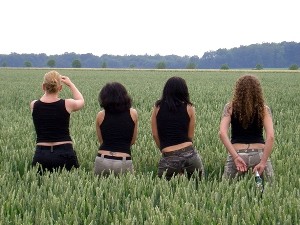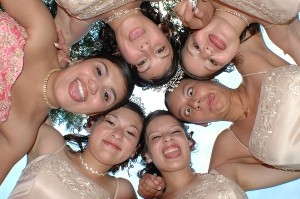 With the emergence of terms like “bromance” explaining close, emotionally intense, non-sexual, affectionate, homo social male bond that exceeds usual friendship, validates the dynamics of female friendship making it an interesting line of thinking. Female bonding is different than male bonding, but the question raised is if women can form deep (non-sexual) relationships with each other or are these relationships superficial.
With the emergence of terms like “bromance” explaining close, emotionally intense, non-sexual, affectionate, homo social male bond that exceeds usual friendship, validates the dynamics of female friendship making it an interesting line of thinking. Female bonding is different than male bonding, but the question raised is if women can form deep (non-sexual) relationships with each other or are these relationships superficial.
Real life and reel life reel of examples of female friendships that surpass all other emotional  bonds….. “Oprah and Gayle” are names that have practically become synonymous with “female friendship”. Oprah and Gayle are one of those name pairings that everybody immediately knows — the most powerful woman in media, and her closest confidante. Gayle King has been by Oprah’s side for decades since they first met in 1976, and has been an integral part of her empire, from editing O Magazine to being a special correspondent for the Oprah Winfrey Show.
bonds….. “Oprah and Gayle” are names that have practically become synonymous with “female friendship”. Oprah and Gayle are one of those name pairings that everybody immediately knows — the most powerful woman in media, and her closest confidante. Gayle King has been by Oprah’s side for decades since they first met in 1976, and has been an integral part of her empire, from editing O Magazine to being a special correspondent for the Oprah Winfrey Show.
Oprah has said of their friendship: “I wish every person on earth to experience somebody to care for them and to know them in such a way that they only want the best for you… When you become famous…a lot of people lose oxygen and they can’t make the summit with you. [It’s good] to be able to have somebody who not only can make the summit, but stand at the summit with you and rejoices in your being able to make it.”
Martina Navratilova and Chris Evert These two giants of the sports world were the biggest  rivals in tennis — and best of friends off the court. From 1973 to 1988, they competed against one another in a whopping 80 matches, including 61 finals. But they were such good mates that, after many finals, they’d travel to their next tournament together — no matter who’d won.
rivals in tennis — and best of friends off the court. From 1973 to 1988, they competed against one another in a whopping 80 matches, including 61 finals. But they were such good mates that, after many finals, they’d travel to their next tournament together — no matter who’d won.
Movies like “sex and the city” will forever be iconic not just because of the fashion that was featured, not just because of the roller coaster love stories, but also because of the rock-solid friendship between four women.  30 Rock gave us a tense, difficult, and ultimately rewarding friendship between two women who were dedicated to each other.
30 Rock gave us a tense, difficult, and ultimately rewarding friendship between two women who were dedicated to each other.
The evolution of the nature of women friendship can be dated back to times when men hunted, women gathered. Human brains and behavior are shaped by millions of years as hunters and gatherers and the basic wiring is still the same as it was in the Upper Paleolithic period – the Stone Age.
Homo sapiens are social animals but as a side effect of modernization there has been a profound rise in social isolation. More of us are living alone, often in big cities, working long hours and experiencing a profound sense of alienation and insecurity. But the need for social bonding, the ‘tribal’ instinct, is a deep-rooted part of human nature, hard-wired into the human brain by our evolutionary heritage, and there is convincing evidence that individuals in post-industrial societies are striving to re-create these community bonds, forming ‘neo-tribes’ and ‘pseudo-kin’ relationships.
This longing may perhaps be even more acute among women than men, as women are naturally more social.. Studies consistently show that women are more proficient than men at all forms of communication – verbal and non-verbal – more socially skilled, better at spotting and ‘reading’ the nuances in people’s reactions and behavior and generally more interested in people and relationships.
Women as gatherers and with responsibility for bearing and raising children, also had a critical need to build cooperation and trust with other women. A woman in childbirth or with young babies was highly vulnerable and in need of protection and support – cooperation with other women, both in gathering food and in childcare, was essential to survival. Female friendship – based on cooperation, reciprocal helping and sharing of day-to-day tasks ,child-minding, providing care and support around childbirth, during illness and at other ‘weak’ or defenseless times, required a different kind of trust. It’s a promise of care and love.
Although we no longer face the same dangers or lead the same harsh lives as our Stone Age ancestors, all the same bonding instincts are still in place, and friendship is still a vital part of our lives – perhaps increasingly so in this age of urban alienation and anomie.
 A landmark UCLA study suggests friendships between women are special. They shape who we are and who we are yet to be. They soothe our tumultuous inner world, fill the emotional gaps in our marriage, and help us remember who we really are. By the way, they may do even more.
A landmark UCLA study suggests friendships between women are special. They shape who we are and who we are yet to be. They soothe our tumultuous inner world, fill the emotional gaps in our marriage, and help us remember who we really are. By the way, they may do even more.
That idea of female collectivity, of what can happen amongst a close-knit group of girls or women, is fascinating to me. Female bonding tends to be done more quietly and informally than the male variety, without all the fuss and bother and setting up of fancy clubs. Women just bond: we don’t seem to need all the props and trappings, pomp and ceremony, sports and secrecy and silly names and funny handshakes. All women need is a pajama party, trip to the hairdresser, cooking with each other, a couple of chairs and a pot of tea – maybe not even that.
Scientists now suspect that hanging out with our friends can actually counteract the kind of stomach-quivering stress most of us experience on a daily basis. Study after study has found that social ties reduce our risk of disease by lowering blood pressure, heart rate, and cholesterol. Although the reasons why the psychological benefits of women friendships are  profound are not crystal clear. Friendships seem to lower stress levels and assist women in navigating the ups and downs of life with better ease than those without strong social ties. This beneficial effect of friendship was felt whether the friends lived near or far. An article published on the New York Times website states that women feel they can count on their friends to pull through for them no matter what they are struggling with in their lives. Female friendships often provide help and support during times of crisis or distress as well as during day-to-day struggles. In my experience, female friendship can be one of the strongest human bonds. It is a deep-seated, enduring loyalty that can rival marriage and blood ties in importance and value.
profound are not crystal clear. Friendships seem to lower stress levels and assist women in navigating the ups and downs of life with better ease than those without strong social ties. This beneficial effect of friendship was felt whether the friends lived near or far. An article published on the New York Times website states that women feel they can count on their friends to pull through for them no matter what they are struggling with in their lives. Female friendships often provide help and support during times of crisis or distress as well as during day-to-day struggles. In my experience, female friendship can be one of the strongest human bonds. It is a deep-seated, enduring loyalty that can rival marriage and blood ties in importance and value.
There’s no doubt, says Dr. Klein that friends are helping us live longer. Friends are also  helping us live better. The famed Nurses’ Health Study from Harvard Medical School found that the more friends women had, the less likely they were to develop physical impairments as they aged, and the more likely they were to be leading a joyful life. In fact, the results were so significant, the researchers concluded, that not having close friends or confidants was as detrimental to your health as smoking or carrying extra weight. And that’s not all, when the researchers looked at how well the women functioned after the death of their spouse, they found that even in the face of this biggest stressor of all, those women who had a close friend and confidante were more likely to survive the experience without any new physical impairments or permanent loss of vitality. Those without friends were not always so fortunate.
helping us live better. The famed Nurses’ Health Study from Harvard Medical School found that the more friends women had, the less likely they were to develop physical impairments as they aged, and the more likely they were to be leading a joyful life. In fact, the results were so significant, the researchers concluded, that not having close friends or confidants was as detrimental to your health as smoking or carrying extra weight. And that’s not all, when the researchers looked at how well the women functioned after the death of their spouse, they found that even in the face of this biggest stressor of all, those women who had a close friend and confidante were more likely to survive the experience without any new physical impairments or permanent loss of vitality. Those without friends were not always so fortunate.
Photo source: www.bustle.com
